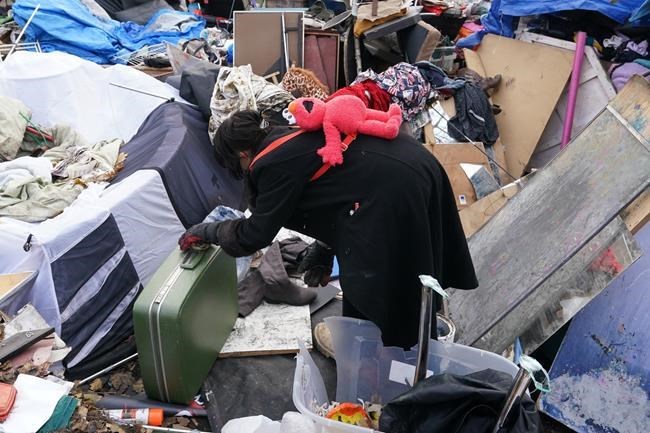TORONTO — People who are homeless have high rates of COVID-19 reinfection, putting the health of an already vulnerable population at further risk, a study published Friday in the BMC Infectious Diseases journal says.
Homeless people in Toronto who had COVID-19 were more than twice as likely to get it again as people who had housing, said lead author Lucie Richard, a senior research associate at the MAP Centre for Urban Health Solutions at St. Michael's Hospital.
The higher rates of reinfection are likely due to increased exposure to the virus as homeless people are "forced to reside in congregate, crowded shared settings which are rife with transmission," Richard said.
They are also more likely than the general public to have underlying health conditions that make them more vulnerable to illness, she said.
The researchers followed 381 homeless people who had previously been infected with COVID-19 for about a year. The study period lasted from June 2021 to October 2022 — a timeframe that began when the Delta variant was dominant and ended when the more infectious Omicron variant had taken hold.
They used PCR and rapid antigen testing to confirm reinfections among the homeless group, compared them to existing data on the rate of reinfection in the general population and found it was twice as high.
But the researchers went a step further and also took blood samples provided by unhoused study participants. That serological testing detected even more COVID reinfections than the PCR and rapid antigen testing had.
That finding confirmed that PCR data undercounted infections, Richard said, noting that more serological testing should be done in the general population to get a more accurate reading of how widespread COVID reinfections are in the era of Omicron and its subvariants.
"Omicron shows up and all of a sudden everybody's getting reinfected who (were) already infected. And people who never got infected got infected for the first time," Richard said.
When the results of the blood tests were factored in, the researchers found that about one-third of participants without homes had been reinfected with COVID-19 at least once.
Multiple infections may increase the risk of negative health outcomes in the future, including long COVID, Richard said.
Although more reinfections would likely also be detected in the general population if blood testing was used, Richard and other experts not involved in the study agree that the risk of reinfection for people who are homeless would still be disproportionately higher.
"We're seeing some of those trends working clinically and ... from a patient-care perspective," said Dr. Andrew Boozary, a primary care physician and executive director of the Gattuso Centre for Social Medicine at the University Health Network in Toronto.
"You can do everything you can and try to avoid COVID. But if you're in a shelter setting where you're packed with far higher (numbers of) people, the air quality or conditions are different," said Boozary, who was not involved in the study.
"This (research)follows in line with previous studies showing that there were five-fold higher mortality rates for people who are unhoused during waves of COVID versus the general public," he said.
Although the study was conducted in Toronto, the results would also apply in other cities, said Dr. Brian Conway, president and medical director of the Vancouver Infectious Diseases Centre.
"This is a warning that we need to take care of our inner cities, especially our homeless (people)," said Conway, who also was not involved in the study.
"(In Vancouver), we have more homeless. We have more people living in shelters and in our inner city, people who are housed are housed very inadequately in substandard accommodations," he said.
Both Boozary and Conway shared Richard's worry that higher rates of COVID reinfection will lead to higher risk of long COVID among homeless people.
"When you look at the prospect of reinfection and then the greater likelihood of long COVID, you're only worsening the disparities for people who are surviving homelessness," said Boozary.
"We know that there's already a higher rate of chronic conditions and chronic disease that people who are without housing are having to face. And then when you throw in this very devastating syndrome of long COVID ... it is devastating," he said.
Conway said it's important to give homeless people easy access to the latest XBB subvariant-targeting COVID-19 vaccine to help reduce reinfection — and it's also vital to address the issue of housing.
"It isn't us and them. It's us and us. And these people are us, and they're obviously living under circumstances that seem to have them reacquire COVID repeatedly. And we owe it to them to try and change those conditions," he said.
This report by The Canadian Press was first published Feb. 2, 2024.
Canadian Press health coverage receives support through a partnership with the Canadian Medical Association. CP is solely responsible for this content.
Nicole Ireland, The Canadian Press

